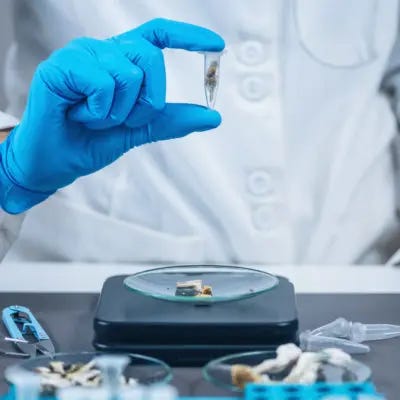Can Psychedelics Help Increase the Mental Healthcare Supply?
Paraprofessionals and alternative treatments may make mental healthcare more accessible and affordable
By Gregory Ferenstein
Just before President Biden’s 2022 State of the Union address, the White House announced a priority initiative to address what it called “an unprecedented mental health crisis among people of all ages.” At the heart of the crisis is a “severe shortage of behavioral health providers.” Licensed healthcare services are overwhelmed with demand from millions of people stressed from an ongoing pandemic and its economic fallout. To solve this problem, policymakers should reduce regulatory barriers for would-be practitioners and consider alternative methods of mental health treatment.
Lowering Legal Barriers
Educational and regulatory requirements contribute to the supply problem of mental health professionals. It can take at least three years of intensive education—and often much longer—to become a licensed mental health provider. If thousands of new student providers had begun training at the beginning of the COVID-19 pandemic, they’d still be months or years away from offering services. Further, burdensome licensing requirements are a well-known cause of expensive and scarce medical services because they limit the supply of medical providers.
So, the White House has put forth a solution: peer counselors, that is, certified professionals who can be trained in a matter of weeks and qualified on the basis of their personal experiences working through their own issues. Research suggests that the counsel of trained peers can often be just as good as more traditional therapy—and, in some cases, even more effective. Unfortunately, there is a major disadvantage of peer counselors—they cannot prescribe medication. And there are serious limits to talk therapy alone.
The state of Oregon may have found a scalable solution that combines the effectiveness of prescription medication with the low licensing barriers of peer counselors: psychedelics “facilitators”—people who oversee a psychedelic experience. Oregon voters recently passed a ballot initiative to legalize the psychedelic in “magic mushrooms,” psilocybin, which is an extraordinarily promising medicine for treating a range of mental health challenges. More importantly, the ballot initiative requires the state to design a completely novel category of mental health professionals who are permitted to dispense and oversee psilocybin experiences.
The initial guidelines from Oregon’s expert roundtable recommended a regulation that would allow a psychedelics facilitator to be trained in as little as 72 hours—or about two weeks of part-time school. Many, if not most, certified facilitators will be the equivalent of peer counselors—people who have experienced using psychedelics to resolve their own issues.
Addressing Safety Concerns
Some readers will understandably worry about barely trained people overseeing psychedelic experiences. But this practice has been occurring for decades around the world. After psychedelics were banned during the “war on drugs,” enthusiasts continued to practice underground, honing the practice of “trip sitting” over the past 50 or so years. The practices became so refined that they are now the basis for dozens of government-sanctioned psychedelics-assisted therapy studies at many of the world’s leading research institutes. Veteran underground practitioners eventually became leaders in developing the legal protocols for FDA-approved clinical trials.
Moreover, from my experience in the aboveground and underground professional psychedelics markets, a typical trip-sitting session is quite tame. A group of 5-30 people will lie down with blankets and eye shades while music plays in the background. Before taking the psilocybin, participants will be briefed on what to expect and instructed to work on a particular self-improvement goal. After, they’ll do light group talk therapy to share their experiences and insights.
Difficult and harmful trips do happen, but they are often due to other factors: using psilocybin recklessly in dangerous situations, for example, or combining it with other street drugs or using it without mental preparation to manage difficult emotions. And even though magic mushrooms are often consumed in unsupervised settings, they are still for the most part considered one of the safest recreational drugs available.
Not all psychedelics lend themselves to trip-sitting, however. Some, such as the Amazonian brew ayahuasca, are quite physically intense, and those trips are more often overseen by those who have years of training with indigenous groups. But even though the facilitator model won’t necessarily work for all psychedelics, it can still be useful in many cases.
Reducing Treatment Costs
Even better, psychedelics-assisted mental health treatment is estimated to be far less expensive than traditional therapies. A single six-hour psychedelics session, paired with a few additional counseling sessions, can provide lasting relief from symptoms of mental illness for more than a year. That’s a much better outcome at a much lower cost than daily antidepressant use from a licensed provider.
But even with psychedelics therapy, six-plus hours of a licensed professional’s time at $150 or more per hour can be very expensive. In the underground, a single session can cost $1,000-$2,000 in my experience, and industry insiders are concerned that cost will be a significant barrier to poorer communities. However, fewer regulatory barriers may lower costs and thus help promote equitable access.
Paraprofessionals are not a substitute for all licensed mental healthcare providers. But many mental health illnesses and symptoms are nonacute: bouts of anxiety, burnout and depression that may hurt us at work or in our relationships, but are not disabling. Many people would pursue regular talk therapy for treatment of these nonacute mental health issues, but they are stymied when it is unavailable or unaffordable. For these people, paraprofessionals can provide a good alternative to more traditional talk therapy.
Given the overwhelming demand for and extraordinary costs of mental healthcare, Oregon’s experiment in paraprofessional peer counseling may show us a much better way of addressing mental healthcare shortages. Expanding the range of available treatments and the types of providers who are allowed to give those treatments will make mental healthcare more accessible and affordable for all Americans.


